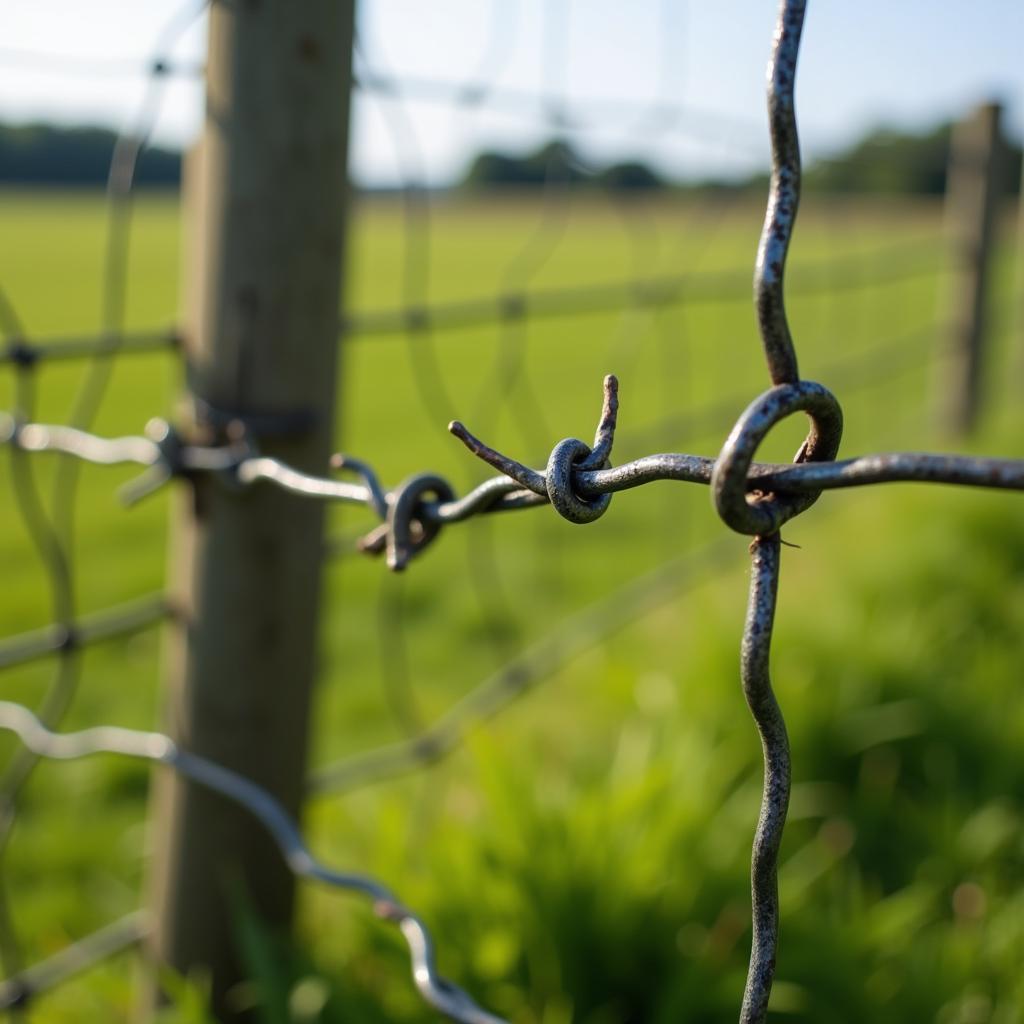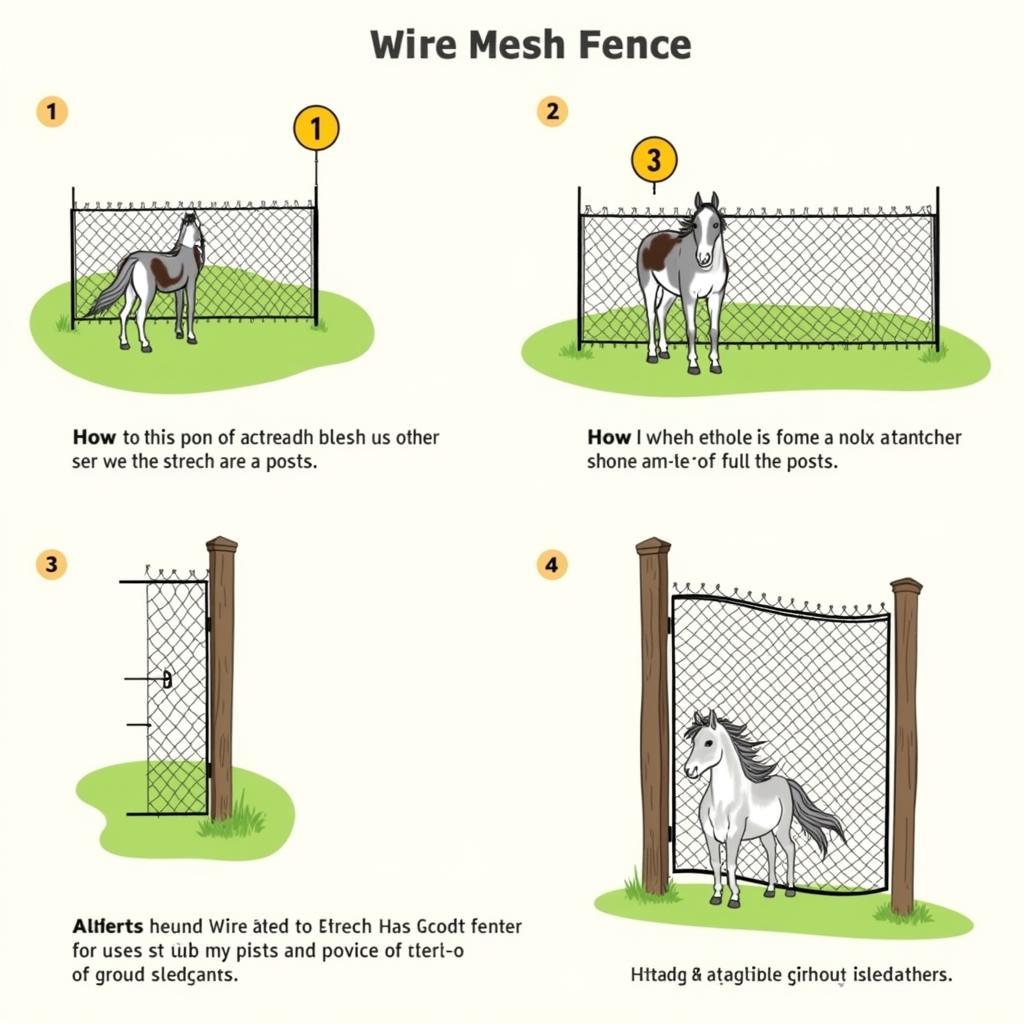Wire mesh horse fencing is a popular and practical choice for securing your equine companions. It’s known for its durability, visibility, and ability to create a safe and contained environment for your horses. But with various options available, it’s essential to understand the nuances of wire mesh fencing to make the best choice for your needs.
Choosing the Right Wire Mesh Horse Fence
Selecting the correct fencing can be daunting with so many different types of wire mesh horse fencing available. Here’s a breakdown of the most common types:
- Welded Wire Mesh: This type is known for its strength and rigidity. The wires are welded at each intersection, making it difficult for horses to push through or break the fence. It’s an excellent option for containing high-energy horses or those prone to testing boundaries.
- Woven Wire Mesh: Offering flexibility and affordability, woven wire fencing is suitable for larger pastures with gentler terrain. The wires are woven together, allowing the fence to adapt to uneven ground.
- V-Mesh Wire Fencing: This type provides superior strength due to its V-shaped crimp design. The crimps provide extra rigidity, making it extremely difficult for horses to damage. V-mesh is particularly beneficial for areas where horses might challenge the fence, such as near gates or feeding areas.
 Welded Wire Horse Fence
Welded Wire Horse Fence
Factors to Consider When Choosing Wire Mesh
When deciding on the best Wire Mesh Horse Fence for your property, consider the following factors:
- Horse Temperament: Assess your horses’ temperaments. Are they known for being escape artists or relatively calm? A more robust fence, like welded wire mesh, might be necessary for horses prone to testing boundaries.
- Budget: Different types of wire mesh come at different price points. While woven wire might be budget-friendly, welded or V-mesh offers more durability, albeit at a higher initial cost.
- Aesthetics: Wire mesh fencing comes in various colors and finishes. Consider your aesthetic preferences and how the fence blends into your property’s overall look.
Installation Tips for a Secure Enclosure
Proper installation is crucial for ensuring your wire mesh horse fence’s longevity and effectiveness. Here are some essential tips for a successful installation:
- Sturdy Posts: Use pressure-treated wood posts or metal T-posts to support your fence. The posts should be spaced appropriately, typically 8-12 feet apart, depending on the fence type and terrain.
- Proper Tension: Maintaining proper tension is vital for preventing sagging or damage. Use a fence stretcher to ensure the wire mesh is taut between posts.
- Ground Clearance: Leave a few inches of ground clearance to prevent horses from stepping on the bottom wire and potentially injuring themselves.
- Secure Gates: Install sturdy gates with reliable latches to ensure your horses don’t escape and to allow easy access to the pasture.
 Installing Wire Mesh Horse Fence
Installing Wire Mesh Horse Fence
Maintaining Your Wire Mesh Horse Fence
Once installed, your wire mesh fence requires regular maintenance to ensure its longevity and effectiveness:
- Regular Inspection: Walk your fence line regularly to check for any damage, loose wires, or potential hazards. Promptly address any issues to prevent injuries to your horses.
- Vegetation Control: Trim any vegetation growing near or into the fence line. Overgrown vegetation can weaken the fence and provide hiding spots for potential predators.
- Rust Prevention: While galvanized wire mesh offers rust resistance, it’s essential to address any scratches or exposed metal with rust-resistant paint to prevent corrosion.
Wire Mesh Horse Fence: Safety and Security
Wire mesh horse fencing is a safe and secure option when installed and maintained correctly. However, it’s crucial to be mindful of potential hazards and take precautions to keep your horses safe:
- Sharp Edges: Ensure all cut wires are filed down smoothly to eliminate sharp edges that could potentially injure your horses.
- Loose Wires: Regularly inspect for and repair loose wires to prevent horses from getting entangled or injured.
- Gate Safety: Use secure latches on all gates to prevent accidental openings and escapes. Consider adding safety features like spring-loaded hinges and top latches for added security.
Conclusion
Investing in a high-quality wire mesh horse fence is essential for creating a safe, secure, and functional environment for your beloved equine companions. By carefully considering your horses’ needs, the specific requirements of your property, and following proper installation and maintenance practices, you can ensure your wire mesh fence provides years of reliable service.
Remember, a well-maintained fence not only protects your horses but also provides peace of mind, knowing they are safe and secure within their designated area. For any questions or assistance, don’t hesitate to contact us. Call us at 0772127271, email us at [email protected], or visit our location at QGM2+WX2, Vị Trung, Vị Thuỷ, Hậu Giang, Việt Nam. Our dedicated team is available 24/7 to assist you!